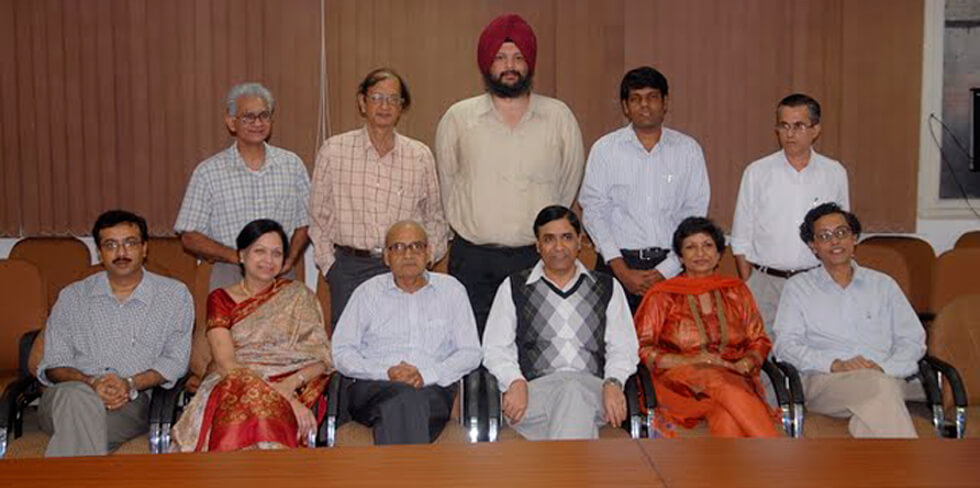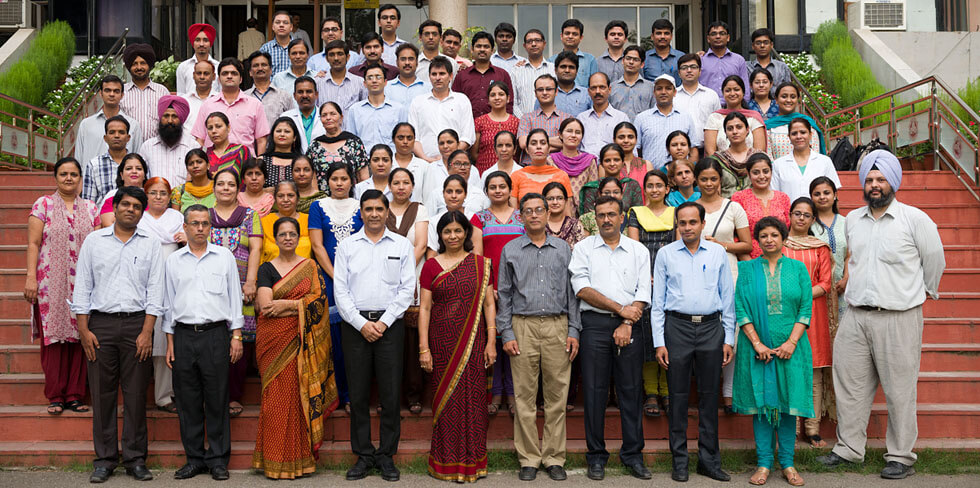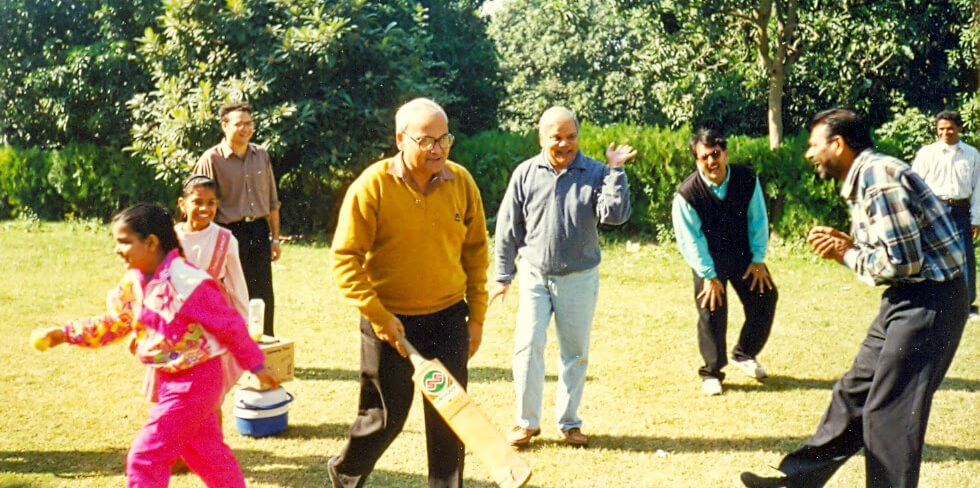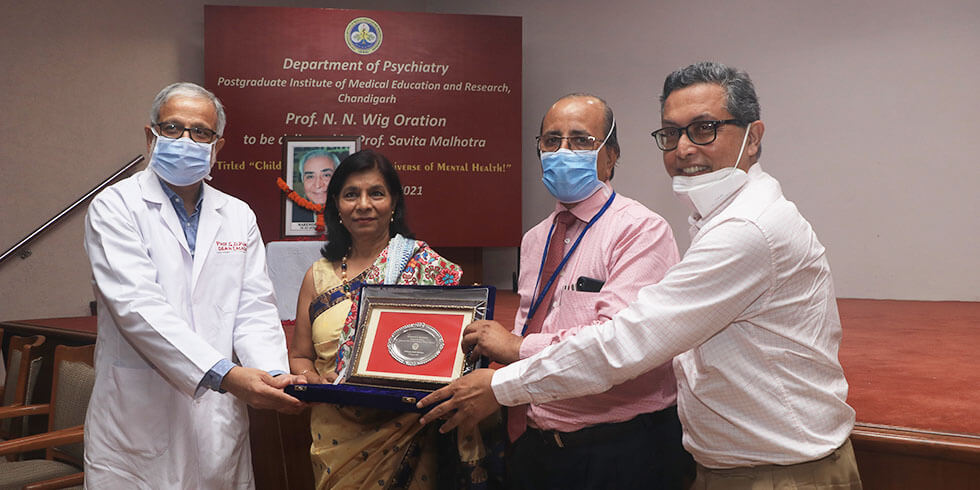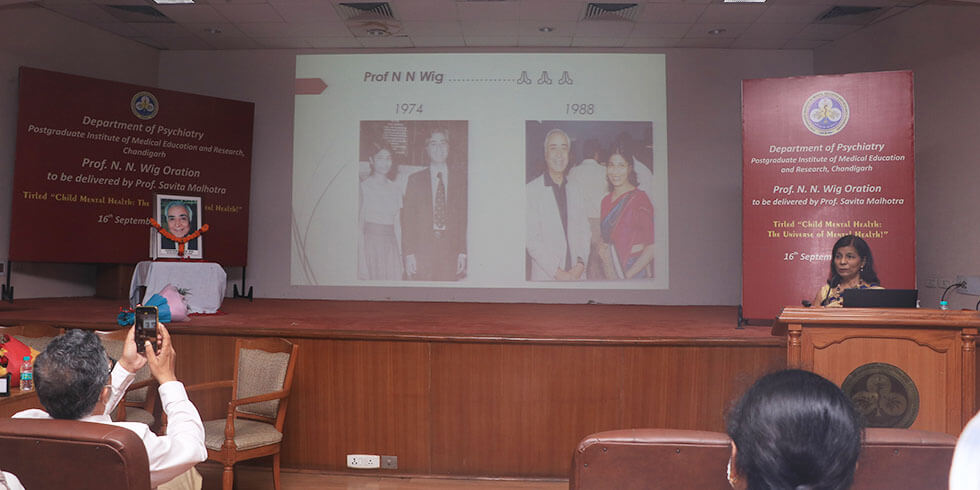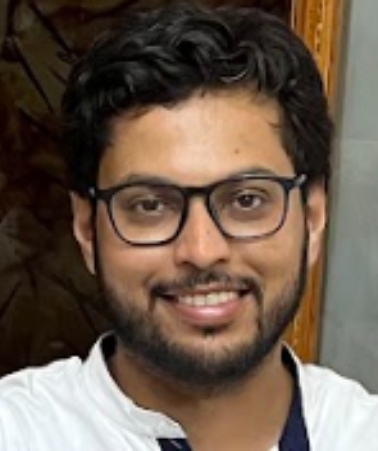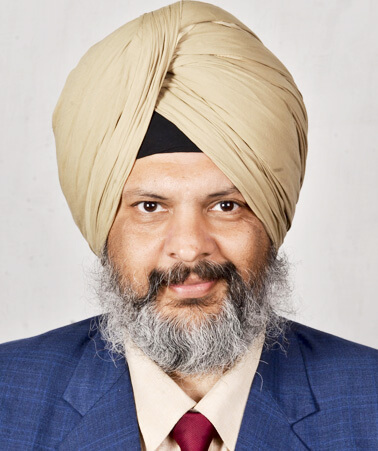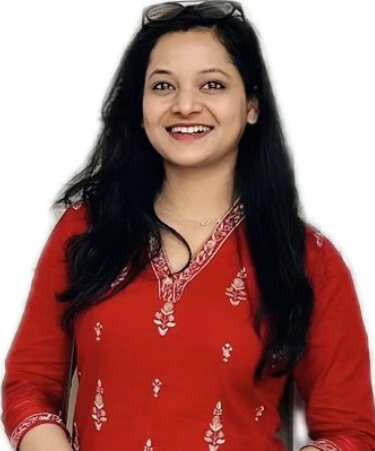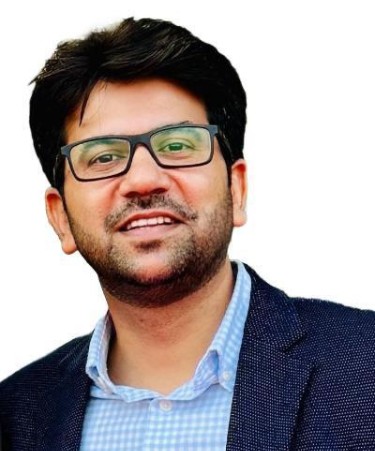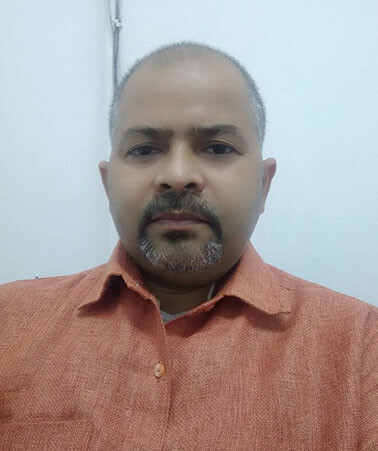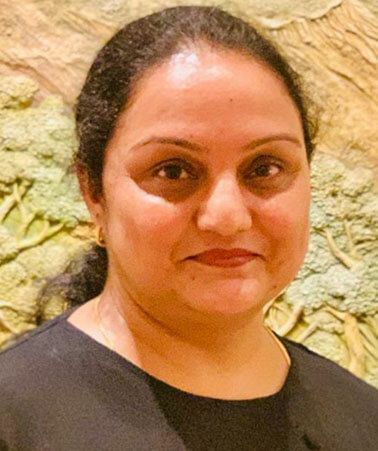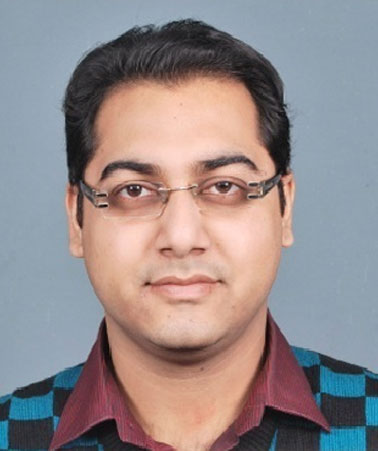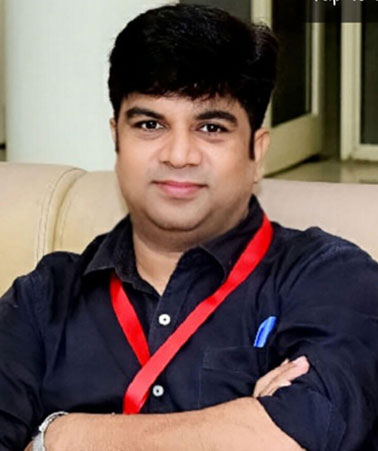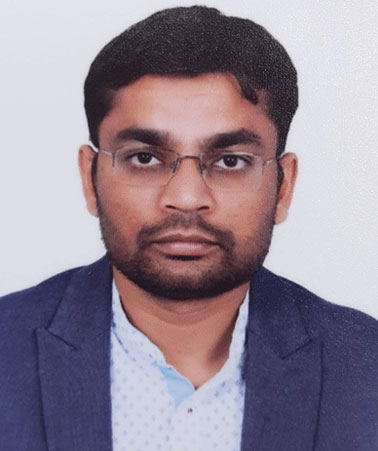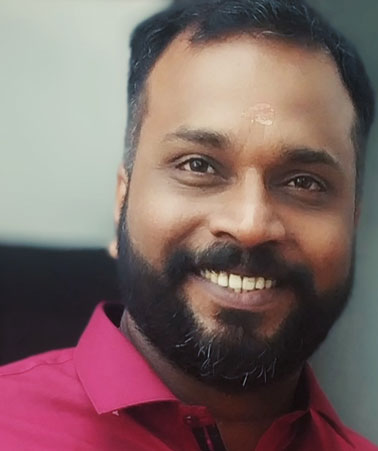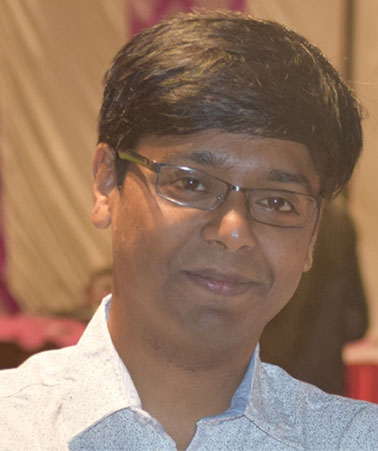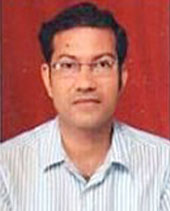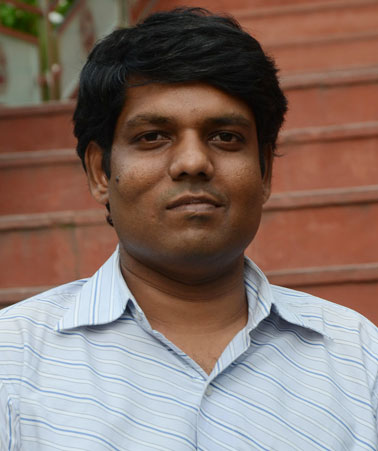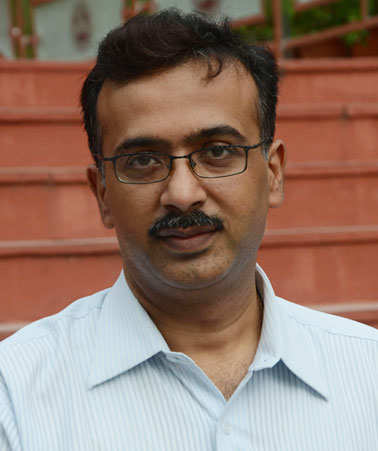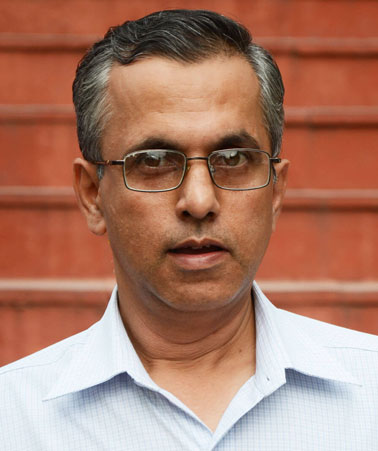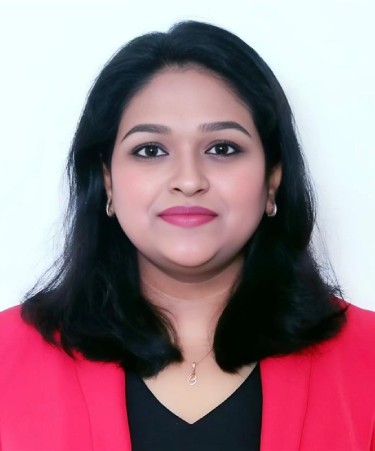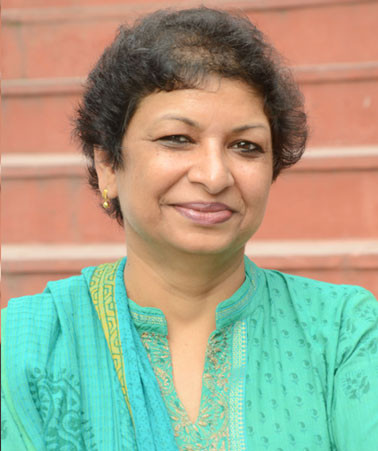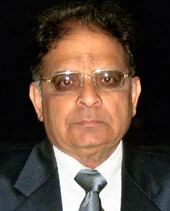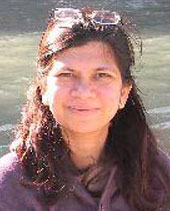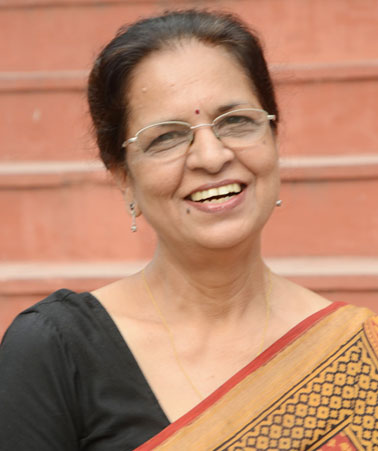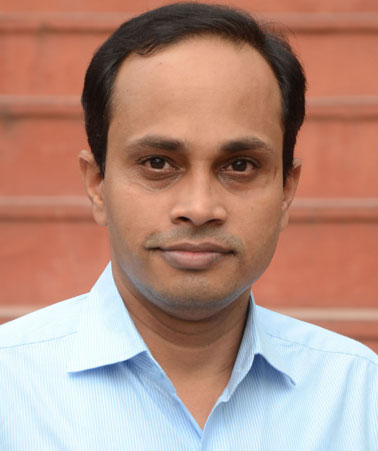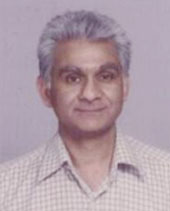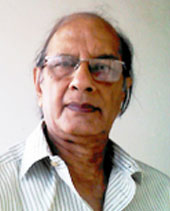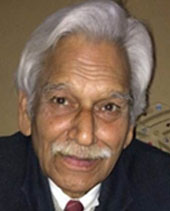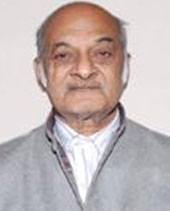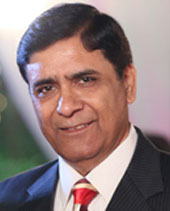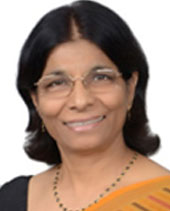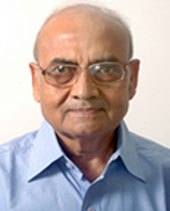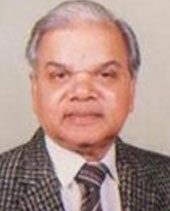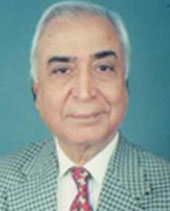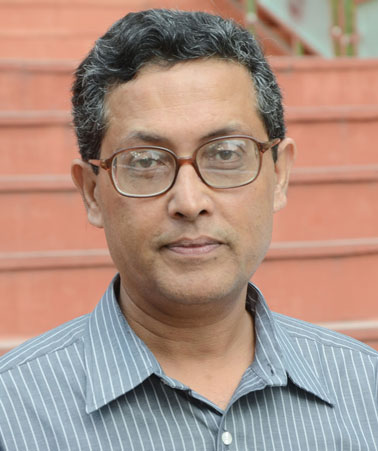The Department of Psychiatry of the Institute provides a three-year junior residency training programme in psychiatry leading to the degree of M.D. (Psychiatry).
An admission notice is duly advertised in all the leading newspapers usually in the months of April and October every year for the course starting on July 1 and January 1, respectively
Minimum Admission Requirements
To be eligible for admission to MD (Psychiatry) course of the institutes, a candidate must possess MBBS degree of an institute/university recognized by this Institute and must have completed compulsory internship or rotating housemanship period in a recognized hospital for one year
Selection Criteria
Selection is made on the basis of marks obtained by a candidate in the Combined Entrance Test. Decision of the Dean of the Institute in the matter of selection shall be final
Reservation of seats
Certain number of seats are reserved for candidates belonging to schedule castes/tribes and other backward classes (OBC) of persons in accordance with regulations of the Government of India, provided they fulfil the minimum admission requirements prescribed by the Institute. A number of seats are also reserved for those with a minimum of work experience in rural areas. A limited number of candidates sponsored/deputed by the state and the central governments, including foreign nationals may also be accommodated depending upon the training capacity of the Department, provided they fulfil the minimum admission requirements
Other general information
- There is a well-stocked and up-to-date library and large number of professional journals and periodicals are subscribed for use by the staff and the students
- Private practice in any form during the course is prohibited
- The term starts on July 1 and January 1 respectively and successful candidates must report on these dates sharp as the case may be. Those joining later than these dates have to seek prior permission from the Dean of the Institute – late joining is not allowed beyond the 31st of the concerned month. Those joining later than the 1st of the concerned month have to compensate by surrendering their leave or working beyond the tenure of their residency for as many days
- JRs are allowed 30, 36 and 36 days leave in 1st, 2nd and 3rd year respectively that has status of casual leave. Residents are encouraged to take this leave during vacation times when the routine teaching activities are suspended. One JR must arrange for two covering JRs during the time of his/her leave. Their leave must be approved by the SR in-charge of the area in which the JR is posted. The leave should also be approved by the Faculty I/C of leaves. The final endorsement is by the Head of the Department. For any extraordinary leave that exceeds these 30 days, the Resident has to take special permission from the Dean and the period of his junior residency extends by that many days after completion of the course.
- Period of training is strictly full-time and ordinarily continuous
- At the end of first six months of admission, the performance of each JR will be assessed. In case the performance of any candidate is found to be unsatisfactory, his/her registration may be cancelled
The training programme endeavours to give a general and comprehensive exposure to psychiatry. General objective of the training programme is to enable the candidate to acquire knowledge, skills and desirable attitudes in the principles and practice of psychiatry and gain a particular proficiency in the widely accepted theories and techniques
Specific objectives
The following are the specific objectives and targets of the training programme:
- Clinical Psychiatry: The Residents should attain a high degree of clinical proficiency in history-taking, conducting and reporting psychiatric examination, diagnosis and the treatment of the common psychiatric disorders
- Psychotherapies: The Residents should become familiar with theoretical framework and technique of individual as wells as group psychotherapy, and should be able to conduct such therapies. In addition, it is expected that in the end, they shall have obtained sufficient expertise to supervise JRs in psychotherapy
- Mental Hospital training: Residents are provided with the opportunity to have an extra-mural training in the National Institute of Mental Health and Neurosciences (NIMHANS), Bangalore. During this training the residents will be trained in the forensic Psychiatry (for two weeks), rehabilitation psychiatry (for one week), and clinical psychology (for one week).
- Psychosomatic Disorders: The Residents should develop skills in understanding and managing psychosomatic disorders so as to collaborate more fully with physicians, surgeons and general practitioners
- Emergency Psychiatry: The Residents should become familiar with psychiatric emergencies and their management
- Basic Sciences: The Residents should be thoroughly familiar with basic and applied neuroanatomy, neurophysiology, psychopharmacology, sociology and social psychology
- CAP: The Residents are encouraged and assisted to acquire a sound knowledge of principles and practice of CAP
- Marital & Psychosexual Problems: The Residents should know the basic principles of the treatment of marital and psychosexual problems
- Statistics and Research Methodology: The Residents should gain certain basic skills in statistics and research methodology so as to successfully interpret/conduct/guide others in research
- Clinical Psychology: The Residents are expected to learn the theory and practical aspects of clinical psychology like psychometric assessment and psychological methods of treatment
- Community Psychiatry: The Residents should know the principles and practices of Community Psychiatry so that they can plan, execute and supervise community mental health programmes
- Alcohol and Drug: The Residents should learn to assess and manage the problems of alcohol and drugs.
- Geriatric Psychiatry: The residents should learn about epidemiology of geriatric mental illness, Dementia, geriatric depression, Development of Geriatric Psychiatry services
- Teaching: By participating in CC, seminars, psychosomatic rounds etc. and by actively teaching the JRs and nurses, the residents should learn the basics of teaching so as to be able to teach medical students/personnel when they assume teaching responsibilities in different psychiatric centres later
- Organization and Administration: The Resident should be familiar with the activities of social agencies (e.g. schools, homes for the mentally retarded, university health centres and rehabilitation facilities) and should learn to work very closely with ancillary personnel and social agencies to help his patients
It is anticipated that our graduates will later assume responsible administrative positions in psychiatric centres in India. For this reason they are increasingly exposed to other services, answering family physician’s CL letters, being administrative I/C of out-patient and in-patient units and, taking part in monthly administrative meetings etc .
The Curriculum
Clinical responsibility, formal training courses and informal training programmes of the Department are as follows:
Formal courses taught are detailed later. All the courses are divided in 6 semestersandrepeated every three years. The JR must complete each course sometime during his tenure of training
Clinical posting: Each Resident is given clinical responsibility as full time assignment tovarious areas in rotation. The general schedule of clinical posting follows the following scheme:
| Schedule of clinical postings | |
|---|---|
| Ward | Total |
| OPD | 10 months |
| Neurology | 2 months |
| Consultation-Liaison | 3 months |
| Mental Hospital | 1 month |
| Clinical Psychology | 1 months |
| DDTC | 4 months |
| Community Psychiatry | 1 month |
| Psychotherapy | 1 month |
| CAP | 3 months |
The Resident is given full responsibility for the patient care and the record keeping under the supervision of the SRs and Consultants. The Resident also takes patients for individual as well as group psychotherapies. He has to complete at least 100 hours of individual psychotherapy and receives one hour a week of supervision
Informal teaching activities/teaching methods
Seminars: There is a one and half hour seminar weekly in which the JRs present material on assigned topics in rotation. A topic is assigned to two JRs. The names of the JRs/SRs are notified well ahead of time and the JRs are expected to request one of the Consultants to chair their seminar preferably 2 months before the scheduled presentation. Each of them present one part of the seminar. JRs are required to tell extempore and must not copy the material from the source. They should understand the concept and incorporate that in their presentation. Both presenters must complete their presentation by one hour leaving at least half hour for discussion in which all trainees are supposed to participate. One SR is also actively involved in the preparation of the seminar. He is expected to mentor the JRs. The final seminar slides to be presented must be approved by the Faculty/Chairperson of the seminar. Generally the topics covered are those that supplement the formal teaching programme. The presentation of the seminar as well as the participation of other JRs in the seminar is subjected to evaluation, the marks of which are added to the scores of internal assessments. The Faculty member in-charge of training programme of the JRs is the one who carries out these evaluations. The DDTC also organizes a seminar once a month
Case Conference: A JR prepares and presents a case of academic interest by rotation and it is attended by all the members of the Department. JRs can present cases for which they have done the work-up and have managed for a substantial period of time. The cases can be taken from Psychiatry ward, OPD, DDTC OPD/ward, CAP. JRs must contact the Faculty of the case preferably a month prior to the presentation and the final slides must be seen and approved by the Faculty. JRs are allowed to present not more than half hour and their presentation is followed by questions and clarification from the house. JRs also must take informed consent (verbal) from the patient (or proxy consent from the family) before presentation. The patient is expected to be present in person during the day of cases conference for the purpose of face to face interview which is to be conducted by the Chairperson of CC. Following the interview the house is required to answer the questions asked by the presenter, mostly regarding their opinion on diagnosis and management
Psychosomatic Rounds: This is a presentation of a case of psychosomatic illness, or a medical illness with pronounced psychiatric problems. It is held weekly in collaboration with Departments of Internal Medicine, Neurology, General Surgery and Paediatrics and is attended by the faculty and the Residents of Psychiatry and the concerned Department
Case presentation: All new in-patients and outpatients cases are reviewed with one of the Faculties. In addition, the Resident is required to present case material at routine rounds and other CCs.
Students’ Clinical Meeting: Residents presents (in rotation) once a month a case of sufficient common interest in the joint forum of the Department of Internal Medicine. One Consultant has been made in-charge for this academic activity. The JR must contact the consultant in charge at least a month prior to the presentation and obtain permission for presenting the case. The SR involved in the patient’s care must contribute in preparing the presentation. The SR is also responsible for the comments that have to be made following the presentation of the JR. Final slides must be approved by the Consultant I/C for this academic activity
Staff Clinical Meeting: Residents learn from the case presentations made by the faculty of Psychiatry Department once every six months at the clinical meeting of the medical specialties group of the Institute.
Social Sciences: Lecture courses in sociology, cultural anthropology and social psychology are given by the faculty of the respective Departments of the Punjab University. All trainees are expected to attend these. These courses are specially organized for our students
Research Forum: It is a monthly meeting of one hour each in which the Residents present their plan of research as well as the report of the completed work of their projects. The other research scholars/workers in the Department also participate in it. The Faculty, residents and the non-medical professionals make critical comments and suggestions
Extra-mural activities: Residents are encouraged to attend certain academic/semi-academic activities in the allied subjects outside, e.g. seminars/lectures in Punjab University (Department s of Sociology and Psychology), Neurology seminars and Saturday Institute talk, etc. Notices regarding these are displayed from time to time
Journal Club: It is a monthly meeting in which a M.D. Senior Resident (SR) presents a critical evaluation of a research paper from a journal
The Thesis:
Every candidate is required to submit a thesis as an essential requirement for the award of the degree. The plan of work for the thesis shall be submitted to the Dean of the Institute, by the candidate through his/her supervisor and the Head of the Department, within the first year of his/her admission. The Dean will convey his approval of the proposed plan of work within one month of its receipt by him. The work for the thesis shall be done by the candidate under the supervision of a Faculty member(s) of the Department, who shall certify that facilitates for work are available and will be provided. Chief Guide will be allotted as per the Departmental Rota consists of a common pool of all Faculty Members arranged as per Seniority. This submitted Protocol would be assessed by the Institute Ethics Committee. Candidate has to appear for an interview with Thesis and Ethics Committee for the approval of the Protocol. Final thesis is to be submitted by 2.5 years of Residency. The period of submission of thesis can be extended beyond 2.5 years up to a maximum of one month by the Dean only in exceptional circumstances on the recommendations of the Guide and the Head of the Department. No candidate shall be allowed to appear in the MD examination until two external examiners appointed for this purpose by the Dean have approved his/her thesis
Content of the Curriculum
Given below are the formal courses that form the content of the curriculum.
- Clinical Psychiatry I – History of psychiatry; concept and classification of mental illnesses; history-taking and MSE; symptomatology; organic psychoses
- General psychology – Schools of psychology; perception; attention; learning; memory; thinking; emotions; intelligence; personality
- Psychodynamics – Introduction and relevance; Sigmund Freud; Instinct theory; topographical and structural theories of the psyche; Libido theory and psychosexual development; mental mechanisms; psychodynamics of specific psychiatric illnesses; Post Freudians and Neo-Freudians; Ego psychology; cultural psychodynamics; critical review
- Clinical Psychiatry II – Functional Psychoses (Schizophrenia, Affective Disorders, Paranoid States, Other Non-organic/Reactive Psychoses): their definition, concept & classification; signs & symptoms; diagnosis and differential diagnosis; epidemiology; etiological theories; outcome; prognosis and management
- Clinical Psychology – Intelligence & intelligence tests; attention & concentration measures; memory and other cognitive functions; personality; definition and development; standardization of questionnaires; projective tests
- Psychotherapy -I – Definition and classification; spontaneous cure and helping situations, re-educative and re-constructive therapies; selection and assessment of patients; the contract; the conduct of therapy; regression, transference and counter-transference; interpretation; resistance; acting out, working-through; dream interpretation; termination; therapy of specific illnesses; schools of therapy and recent trends; conjoint family and group therapies; behaviour therapy; Tran cultural aspects of psychotherapy
- Clinical Psychiatry III – GAD and Panic Disorders, Phobic Disorders, Dissociative disorders, Somatoform Disorders, Depersonalisation and Derealisation, OCD, Bereavement and Grief, Stress related and Adjustment Disorders, Personality disorders: their definition, concept and classification, signs and symptoms, diagnosis and differential diagnosis, etiological theories, epidemiology, course, outcome, prognosis and management
- Research methodology – population and sampling, measures of central tendency and variability, parametric and nonparametric statistics, correlation; ANOVA; reliability, validity, internal consistency; multivariate statistics; research in clinical and biological psychiatry; research in effectiveness of treatment modalities
- Social Psychology & Sociology – Social stratification, social change and institutions, social factors and mental health, leadership, social attitudes, sociological theories of psychiatric morbidity, social forms of therapies
- Psychotherapy-II – Behavior Therapies; Client Centered Therapies; Group Psychotherapies; Family Therapies; Marital and Sexual Therapies; Psychotherapies in Children; RationalEmotive Therapies; Relaxation Techniques; Cognitive Therapies; Short Term Psychotherapies; Eastern Psychotherapies
- Clinical psychiatry IV –Psychosomatic Disorders- History, Concept and Classification; Psychosomatic Disorders related to GIT, cardiac and Circulatory System, Respiratory System, Nervous System, Endocrine System, Auto-Immune System, Skin; Suicide and parasuicide; Cancer and Psychiatry; Consultation- Liasion Psychiatry
- Neuroanatomy and Neurophysiology – Neuroanatomy—Neuron and Synapse; Spinal Cord, Sensory and Motor Tracts; Brain Stem and its Columns; Cerebral Cortex with functions; Limbic System; Basal Ganglion; RAS, autonomic Nervous System; Cerebellum, Thalamus; Meninges and Venous Sinuses, Neurophysiology– Neurophysiology of sleep, dreams, sexual behaviour, memory, emotions, intelligence; evoked potentials and psychiatric disorders; Applied Neurophysiology-EEG and Evoked Potentials
- Psychopharmacology & Biochemistry – Neurotransmitters, pharmacokinetics, clinical trials, drug interactions, psychotropic drugs (antipsychotics, antidepressants, anxiolytics, lithium, CNS stimulants); antiparkinsonian drugs, hypnotics & sedatives
- Clinical Psychiatry-V- Substance related Disorders- Alcohol, Opioid, Cannabis, Sedatives and Hypnotics: Epidemiology, Signs and Symptoms, Etiological Theories, Relapse Prevention, Pharmacoprophylaxis, self help groups, Psychosocial Therapies; Sleep Disorders; Eating Disorders; Impulse Control Disorders; Paraphilias; Sexual Dysfunctions; Gender Identity Disorders and Ego dystonic Homosexuality
- Child Psychiatry – History; Classification of Childhood Psychiatric Disorders; Psychiatric examination of children, neurological and psychological assessment, child development; definition, classification, diagnosis and treatment of behaviour and emotional disorders, neurotic disorders; PDD; ADHD; Specific Learning Disorders; psychiatric disorders of Adolescence
- Community Psychiatry & Epidemiology – Epidemiology: history, uses, application, indices, epidemiological studies in India; Community Psychiatry: introduction, concept, psychosocial factors and mental health; studies of suicide; prevention of mental disorders; national mental health services
- Clinical Psychiatry-VI—HIV Infection; Death and Dying; Sensory Deprivation; Rating Scales; Electroconvulsive Therapies; Psychiatric Emergencies; Management Guidelines for Schizophrenia, Affective Disorders, OCD and Anxiety and related Disorders
- Mental Retardation – Definition, classification, epidemiology, etiology, clinical features, diagnosis and assessment, investigation and management, Law and Rights
- Forensic & Geriatric Psychiatry – Compulsory admissions, management of dangerous patients, mental health act, criminal & civil responsibility, ethical/legal aspects of psychiatric practice, informed consent, epidemiology and classification and management of psychogeriatric problems, structure and organization of psychogeriatric services.
For MD Psychiatry Residents the course comprises six semesters (three years) beginning from January 1997:
| Formal Courses | Credit hours |
|---|---|
| 1st Semester (Jan – June) | |
| 1. Clinical Psychiatry – I | 2 |
| 2. General Psychology | 2 |
| 3. Psychodynamics | 3 |
| 2nd Semester (July-Dec) | |
| 4. Clinical Psychiatry – II | 2 |
| 5. Clinical Psychology | 2 |
| 6. Psychotherapy I | 3 |
| 3rd Semester (Jan-June) | |
| 7. Clinical Psychiatry III | 2 |
| 8. Research Methodology | 2 |
| 9. Social Psychology and Sociology | 2 |
| 10. Psychotherapy-II | 3 |
| 4th Semester (July-Dec) | |
| 11. Clinical Psychiatry IV | 2 |
| 12. Neuroanatomy& Neurophysiology | 2 |
| 13. Psychopharmacology | 2 |
| 5th Semester (Jan-June) | |
| 14. Clinical Psychiatry V | 2 |
| 15. Child Psychiatry | 2 |
| 16. Community Psychiatry and Epidemiology | 1 |
| 6th Semester (July-Dec) | |
| 17. Clinical Psychiatry VI | 2 |
| 18. Mental Retardation | 1 |
| 19. Forensic & Geriatric Psychiatric | 1 |
| 38 Hours | |
| Informal training programme: | |
| 1. Presentations and participation in Case Conferences, seminars etc. 2 hour credit per semester (6) |
12 |
| 2. Clinical examination | 6 |
| i. hour per semester (6) | — |
| 18 Hours | |
| Clinical responsibility: | |
| 2 credit hours per semester (6) | 12 |
| Grand Total | 68 hours |
- Internal Assessment: Systematic internal assessment is made of a candidate’s performance in various formal and informal training programmes and courses throughout the training programme as per the schedule described later in this document. Overall internal assessment is given equal credence in the final MD examination for the decision regarding success or otherwise. Given below is the format/pattern of internal assessment
- Sent-Up requirements: To be sent up for the final MD examination, a candidate must have:
- Successfully completed the course in elementary statistics by the Institute
- Completed 100 individual supervised psychotherapy hours (Payment receipts signed by the Consultant I/C of the case will be verified by the Faculty member I/C of the residency program)
- Got his thesis accepted
- Completed the clinical postings and courses, etc. as per the training program
- Requirement for the degree of M.D.(Psychiatry): For the award of the degree of M.D. (Psychiatry) the candidates must fulfil each of the following requirements:
- Successful completion of the training for a minimum period of three years, to the satisfaction of the faculty of the Department
- Successful completion of the M.D. examination that consists ofFour papers (written) of three hours each as follows:
| Paper | I | Basic Sciences as related to Psychiatry |
| Paper | II | Clinical Psychiatry |
| Paper | III | Psychiatric theory and Psychiatric specialties |
| Paper | IV | Neurology and General Medicine as related to Psychiatry |
- Practical/clinical examination comprising presentation of an OPD case, a Neurology case and a Ward case that has been managed by the candidate.
- Viva-voce examination
- Approval of the thesis by the External Examiners
- Department may award two or more medals for each batch of Residents for outstanding performance in the MD Final exam and consistent good performance in the Internal Assessments
Current Faculty
Past Faculty
Website Stats






 Users Today : 1
Users Today : 1 Users Yesterday : 18
Users Yesterday : 18 Users Last 7 days : 19
Users Last 7 days : 19 Users Last 30 days : 291
Users Last 30 days : 291
Website Stats






 Users Today : 1
Users Today : 1 Users Yesterday : 18
Users Yesterday : 18 Users Last 7 days : 19
Users Last 7 days : 19 Users Last 30 days : 291
Users Last 30 days : 291





